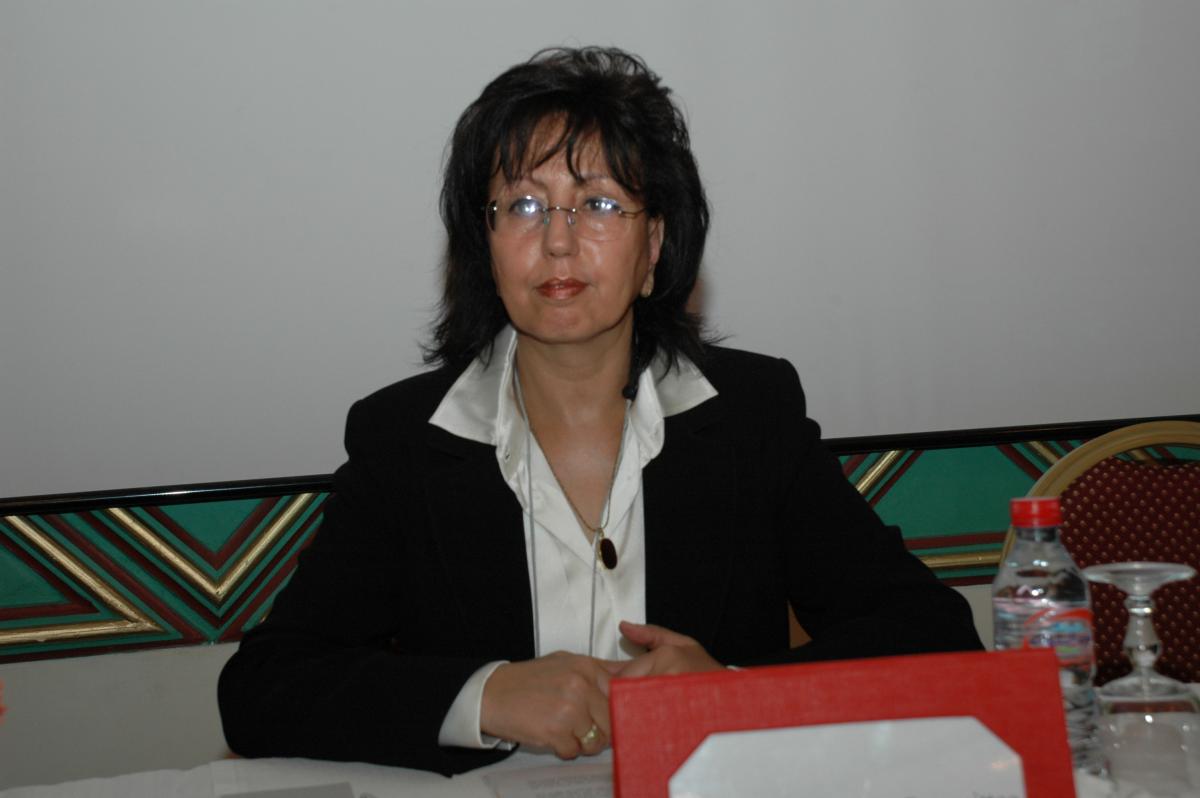Brief CV:
 Prof. Dr. Laila MANDI is full professor of Environmental Sciences at the University Cadi Ayyad, Marrakech (Morocco). Her research Interests are: water management, rational use of water, wastewater treatment, recycling and reuse, water quality. In 2001, she was nominated as a National Co-ordinator of the Pole of competences on “water and Environment” which represents a Moroccan cluster developing research on the topic of “integrated water resources management”.
Prof. Dr. Laila MANDI is full professor of Environmental Sciences at the University Cadi Ayyad, Marrakech (Morocco). Her research Interests are: water management, rational use of water, wastewater treatment, recycling and reuse, water quality. In 2001, she was nominated as a National Co-ordinator of the Pole of competences on “water and Environment” which represents a Moroccan cluster developing research on the topic of “integrated water resources management”.
In 2007, she was nominated as a Director of the National Centre for Studies and Research on Water and Energy (CNEREE) at the University Cadi Ayyad. She is recognised internationally as expert, evaluator and reviewer in the domain of water and environment. She was involved in several EU and non EU projects. Has published several peer-reviewed scientific papers and book chapters; spoken also at national, international conferences and workshops as lecturer. She was a member of scientific committee of many international conferences and has organised several international events (conferences, workshops, seminars, etc.) on water technologies and environment.
Interview:
Question: What is your vision of the EU-MPC cooperation in RTDI? In your opinion, which are the new challenges of this cooperation?
Answer: The current EU-MED cooperation in research, technological development and innovation (RTDI) constitutes an important opportunity for the development of the Mediterranean partner’s countries. This is foreseen by its contribution to bridge the gap between population & business; promotion of the sustainable development and enhancing the exploitation of the RTD outputs by society and indus- try especially in southern Mediterranean countries. The improvement of this cooperation was enhanced by the creation of the Union for the Mediterranean (UfM) in 2008 of which the institutional instrument RTD monitoring committee (MoCo) is playing an important role to stimulate the Euro-Mediterranean cooperation in the field of Science and Technology and to support the sustainable development of the MPC.
This cooperation is also strengthened through the set up of specific platforms within the FP7 program such as the FP7-INCO.Net MIRA project (Mediterranean Innovation and Research Coordination Action) which contributes greatly to reinforce the dialogue between EU and the Med. countries by bringing together policy makers, stakeholders and practitioners in research and innovation to reflect on and analyse innovation support mechanisms within their regional and na- tional context and to identify common interests in research areas. MIRA project has contributed highly to foster the participation of Mediterranean Partner Countries (MPC) in the EU Seventh Framework Programmes through focused actions like capacity building to increase research capacities, training activities, project writing, clustering, creation of an observatory of EU-MPC cooperation in S&T, etc. Such actions with positive impact should be encouraged and replicated to enhance EU-MED cooperation in the future.However, in spite of the progress obtained by the RTDI current EU-MED cooperation, important challenges still remain in the areas of technological, managerial and policy innovation, human resources development, sharing common knowledge, gathering a new frame and consensus on RTDI at different levels : institutional, economic, social, environmental.For the future of this cooperation, it becomes necessary to strengthen research and innovation in the Southern Mediterranean region with limited technological and innovative capacities; to make linkages between research outputs and innovations and policy, to coordinate the national policies and programmes of the EU Member States and Southern Mediterranean countries in the area of Re- search and Innovation; to build competences in the domain of Research and Innovation (governance, human capital and research infrastructures), to increase mobility opportunities for students, researchers and academics and to develop research cooperation based on mutual benefit, equal participation / co-ownership of EU and MPC researchers.
Q: The Euro-Mediterranean Conference on Research and Innovation (held in Barcelona, in April 2012) identified water use efficiency as one of the Euro-Mediterranean critical issues. In your opinion, which are the main challenges set out by the scientific community? Have you perceived an alignment of MPC policies about this issue?
 A: I had the opportunity to be one of the members of the Water Panel of the Euro-Mediterranean Conference on Research and Innovation of 2-3 April 2012. Many countries in the Mediterranean region are located in the arid regions of the world that are known to have limited water resources and suffer increasing water scarcity. Sustainable management of these resources will become increasingly complex in the future as climate change is expected to increase the frequency and intensity of drought and water shortages. So, the use of water in efficient way becomes a challenge in Mediterranean countries. Currently, there is an increasing concern about the effective and efficient use of water for agriculture and water conservation in general. A debate and dialogue on the perspectives for efficient use of water resources in the Mediterranean region was carried out by scientific communities to assess and promote schemes of water saving, optimal water use and water conservation in different sectors (urban, industrial and agricultural). Important savings can be achieved especially in agriculture through a better use of both technical and economical tools, as well as institutional and human resources. Water saving can also be achieved in both drinking water and industry, but the most beneficial saving in terms of volume would be in irrigated agriculture which consumes more than 80% of the available water resources.
A: I had the opportunity to be one of the members of the Water Panel of the Euro-Mediterranean Conference on Research and Innovation of 2-3 April 2012. Many countries in the Mediterranean region are located in the arid regions of the world that are known to have limited water resources and suffer increasing water scarcity. Sustainable management of these resources will become increasingly complex in the future as climate change is expected to increase the frequency and intensity of drought and water shortages. So, the use of water in efficient way becomes a challenge in Mediterranean countries. Currently, there is an increasing concern about the effective and efficient use of water for agriculture and water conservation in general. A debate and dialogue on the perspectives for efficient use of water resources in the Mediterranean region was carried out by scientific communities to assess and promote schemes of water saving, optimal water use and water conservation in different sectors (urban, industrial and agricultural). Important savings can be achieved especially in agriculture through a better use of both technical and economical tools, as well as institutional and human resources. Water saving can also be achieved in both drinking water and industry, but the most beneficial saving in terms of volume would be in irrigated agriculture which consumes more than 80% of the available water resources.
MPC governments have made great efforts, and have invested heavily, to improve water resources management through the pplication of new technologies in urban and agricultural areas. Such investments are intended to reduce water losses and to increase water availability at local levels. However, when watershed is considered, the issues become more complex and need for more integrated approach.
The improvement of strategies for basin management taking into account the technical, economic, social and environmental aspects, the use of sustainable technological solutions for water treatment recycling and reuse, the efficiency and equity in water policies, developing tools for water quality-quantity monitoring and the improvement of knowledge sharing among practitioners would be the key actions towards a sustainable rational use of water resources.
Q: In your opinion, which is the status of integrated water resources management on the policy agenda of the MPC?
 A: Major current and future problems with fresh water resources in the Mediterranean region arise from the pressure to meet the food, agricultural, human settlement and industrial needs of a fast-growing population. Population in South Mediterranean is increasing, as is tourism, leading to growing demands for water resources, dramatic reduction of water yields, exacerbating conflicts, and to a more pollution which also reduces the availability of water to meet human needs. There is no doubt that for the Mediterranean region under water scarcity conditions, the integrated approach to manage limited water resources and to harness solutions outside the traditional water supply approach has to be an essential requirement for the sustainable development.
A: Major current and future problems with fresh water resources in the Mediterranean region arise from the pressure to meet the food, agricultural, human settlement and industrial needs of a fast-growing population. Population in South Mediterranean is increasing, as is tourism, leading to growing demands for water resources, dramatic reduction of water yields, exacerbating conflicts, and to a more pollution which also reduces the availability of water to meet human needs. There is no doubt that for the Mediterranean region under water scarcity conditions, the integrated approach to manage limited water resources and to harness solutions outside the traditional water supply approach has to be an essential requirement for the sustainable development.
In the north of the Mediterranean, the EU Water Framework Directive (WFD) provides the main policy framework for water management. The WFD outlines an overall strategy for water management and mentions a number of important aspects, namely: river basin management, whereby water resources are managed in an integrated manner at a catchment level. In the south and east of the Mediterranean, countries are taking steps towards IWRM by developing their own national strategies. Many Mediterranean countries are currently in a stage of institutional reform, orienting priorities and practices towards an integrated water resources management (IWRM) approach that complies with several WFD objectives and addressing the same issues. Many countries are in the process of developing their national IWRM plans while a smaller group of countries are still in the very initial phase of preparation. At the same time, countries should mainstream IWRM considerations, methodologies and practices in the implementation of their investment programmes and application projects at the transboundary, national and local levels. Regardless of the level of progress achieved until now it is important to encourage and assist, as appropriate, all the countries of the region in their processes towards integrated management of water resources. Addressing, in particular, environmental and biodiversity concerns in the process of IWRM planning and implementation is of major importance for achieving sustainable development in the Mediterranean the countries.
The adoption of an integrated approach for water resources management is particularly challenging in the Mediterranean region where sectorial approaches in water management are still prevailing due to:
- Weak policy implementation;
- Weak monitoring and assessment at the national and local level;
- Fragmentation of responsibilities between authorities;
- Limited technical, management and enforcement capabilities to address water resource issues;
- Lack of effective operational strategies;
- Financial constraints including lack of financial resources at affordable levels.
Q: In your opinion, which will be consequences of climate change impact in the Mediterranean? In which way water policies should structure water management actions to mitigate them?
 A: The Mediterranean is one of the regions to be affected most by climate change, facing water problems such as scarcity, pollution, conservation, sanitation and management of resources.
A: The Mediterranean is one of the regions to be affected most by climate change, facing water problems such as scarcity, pollution, conservation, sanitation and management of resources.
During this century, climate change may further reduce water availability for global food production, as a result of projected mean changes in temperature and precipitation regimes, as well as due to projected increases in the frequency of extreme events, such as droughts and flooding. Indeed, the recent IPCC Fourth Assessment Report indicates that climate change will have significant impact on crop production and water management systems in coming decades, seriously hindering the irrigated agriculture, which represents the bulk of the demand for water in many countries, and which is also usually the first sector affected by water shortage and increased scarcity, inducing a decreased capacity to maintain per capita food production while meeting water needs for domestic, industrial and environmental purposes.
Consequences of physical water scarcity are showing up, evoking severe environmental degradation including river desiccation and pollution, declining groundwater and water allocation, raising the problem of conflict between cities, regions and countries. There is a necessity to review the methods of water management and strategies against risks due to climate change to reduce vulnerability, loss and damage on short, medium and long terms in the Mediterranean. Adapt to the impacts of climate change on water resources requires technical adjustments and adaptation policies development.
Q: In your opinion, is there a need of a specific treatment of the role of women in water policies and how?
A: Women have played and continue to play an important role in water provision, water management and water use. For example, in Many Mediterranean countries, women play a key role in the domain of agriculture. Unfortunately this role is many times neglected due to the social and cultural conditions. In the other hand, still very few women are present at the level of decision making process mainly in Mediterranean developing countries (Morocco, Algeria, Tunisia, etc.). Integrated water resources management needs the involvement both of women and men so it becomes necessary and urgently to:
- take into consideration gender dimension when drawing water policy
- increase the visibility of women in the programs related to integrated water resource management
- take in consideration the priorities, contributions, needs and constraints of women in water issues and not neglecting the important role they play at local, national and international levels.
- develop actions and mechanisms to attract more women for water management careers
- build the capacities and strengthen the skills of women in water issues mainly in rural areas
- develop research on women and integrated water management



